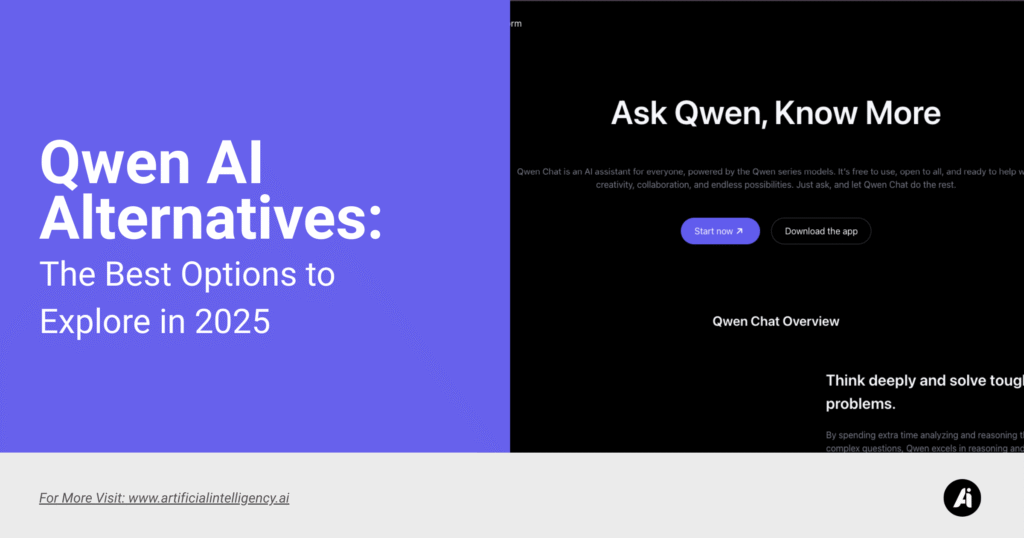Artificial intelligence has quickly become more than just a tool—it’s now a core part of how creators, businesses, and individuals work.
Over the past couple of years, we’ve seen massive growth in AI models that can write, code, translate, summarize, and generate ideas with increasing accuracy.
One of the latest names to make an impact is Qwen AI, a tool that blends high-level capabilities with a focus on accessibility. It has earned attention for being fast, reliable, and developer-friendly, while also appealing to everyday users.
But no single AI platform is perfect for everyone. Each user has unique needs, preferences, and budgets. Some might be looking for stronger coding features, while others may need deeper integrations for business workflows. T
hat’s where alternatives come in. Exploring different AI tools allows you to compare strengths, weigh pricing, and find the option that best aligns with your goals.
In 2025, the market is crowded with impressive competitors, each bringing its own twist to the AI landscape.
In this guide, we’ll walk through some of the best alternatives to Qwen AI. Before diving into them, let’s pause and look at why Qwen matters, why users might seek alternatives, and what value you actually get from exploring other tools.
- Why Qwen AI Matters
- Why People Look for Qwen AI Alternatives
- The Value of Exploring Qwen AI Alternatives
- 1. ChatGPT
- 2. Claude AI
- 3. Gemini
- 4. Jasper AI
- 5. Writesonic
- 6. Perplexity AI
- 7. Copy.ai
- Choosing the Right Qwen AI Alternative
- Balancing Cost and Features
- Integration with Daily Workflows
- Ethical and Security Considerations
- The Future of AI Alternatives
- Final Thoughts
- FAQs
Why Qwen AI Matters
Qwen AI has positioned itself as a serious contender in the AI space, combining large-scale language capabilities with ease of use.
Its ability to generate natural text, understand context, and support multilingual tasks has drawn attention worldwide.
For developers, its open design offers flexibility, while non-technical users appreciate the smooth interface and accessibility.
This dual appeal has helped Qwen grow quickly and gain recognition alongside more established AI names.
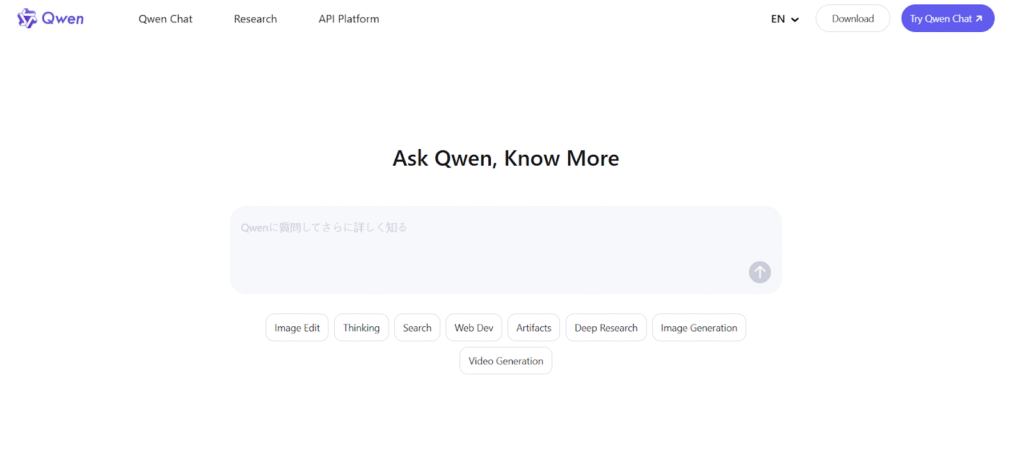
Beyond just features, Qwen AI matters because it reflects the shift toward making powerful AI accessible to everyone.
Its focus on balancing speed, accuracy, and scalability makes it a strong option for both personal and professional use cases.
Why People Look for Qwen AI Alternatives
Despite its strengths, Qwen AI isn’t the right fit for all users. Some businesses may find its integrations limited compared to other platforms that specialize in enterprise solutions.
Others might need more advanced features for niche industries, like healthcare or finance, where compliance and customization are critical.
Pricing is also a deciding factor—what feels affordable for some may feel restrictive for others.
Another reason people explore alternatives is experimentation. Many AI users like to test multiple tools to see which offers the best balance of creativity, accuracy, and efficiency. Since the AI space evolves so quickly, staying open to alternatives ensures you don’t miss out on better options.
The Value of Exploring Qwen AI Alternatives
Looking at alternatives isn’t just about replacing Qwen—it’s about expanding your toolkit. Each AI platform has unique strengths, and sometimes combining more than one gives you the best results.
For example, one tool may excel in content writing, while another outperforms in coding or data analysis. By understanding what’s available, you can match the right tool to the right task.
Exploring alternatives also helps with cost management. If a competitor offers similar or better features at a lower price, that difference can scale significantly for teams or companies using AI daily.
In short, checking out Qwen AI alternatives ensures you’re making the most of your investment in AI.
1. ChatGPT

ChatGPT remains one of the most widely recognized and trusted AI platforms globally. Built with strong natural language processing capabilities, it excels at generating high-quality, human-like text.
The platform supports a wide variety of tasks, including drafting emails, brainstorming ideas, writing essays, coding assistance, and summarizing long documents.
Its ability to adapt tone and style makes it suitable for both casual users and professionals.
Use Case
ChatGPT is ideal for individuals who need a reliable AI companion for everyday tasks as well as businesses that want a versatile assistant for content, customer service, or workflow support.
Students often turn to it for studying and explanations, while professionals use it to increase productivity.
Pros and Cons
Pros: Highly versatile across different domains, robust natural language understanding, and a large user base with strong community support.
Cons: Some advanced features and access to the most powerful models require a subscription, and performance can vary depending on server load.
Pricing
ChatGPT offers a free plan for casual users, while premium tiers (such as ChatGPT Plus) unlock access to faster responses, more advanced models, and additional features.
Enterprise options are also available for large teams.
2. Claude AI

Claude AI, developed by Anthropic, is a next-generation assistant designed with safety and reliability as top priorities.
Its focus is on producing helpful outputs while minimizing harmful or biased responses.
Claude is known for its ability to engage in long-form conversations, process large amounts of text, and maintain consistency across complex reasoning tasks.
It aims to combine creativity with caution, making it appealing for professional and ethical use cases.
Use Case
Claude is best suited for businesses and individuals who want an AI that emphasizes ethical standards and reduces risk in its outputs.
It’s also a great fit for projects that involve sensitive information, as it tends to provide measured, thoughtful responses.
Pros and Cons
Pros: Emphasis on safety and alignment, excellent at processing longer contexts, dependable for ethical use.
Cons: Can feel less flexible for highly experimental or creative outputs compared to some competitors.
Pricing
Claude AI offers free access in some versions, with tiered plans for advanced features.
Enterprise users can access custom integrations and enhanced performance for business-scale deployment.
3. Gemini

Gemini, Google’s rebranded AI assistant (formerly Bard), is built with deep integration into Google’s ecosystem.
It pulls real-time data from the web and works seamlessly with Google Docs, Sheets, and Gmail. Gemini combines conversational skills with the power of search, giving it an edge for fact-checking and up-to-date information.
It’s positioned as both a general-purpose AI assistant and a productivity enhancer.
Use Case
Gemini is ideal for users who already rely heavily on Google’s suite of tools and want smooth integration into their daily workflows.
Researchers, marketers, and business professionals benefit from its ability to access real-time data, create drafts in Docs, or automate spreadsheet tasks.
Pros and Cons
Pros: Deep Google integration, real-time data access, and strong search-backed answers.
Cons: Some features are still in development compared to more mature competitors, and its creativity can sometimes be limited.
Pricing
Gemini has free and paid tiers, with advanced features and faster performance available to premium subscribers.
Enterprise packages are also available for organizations.
4. Jasper AI
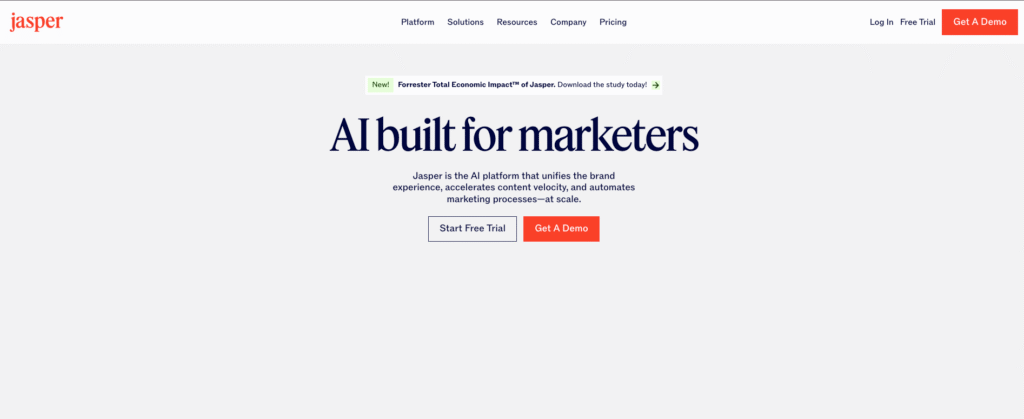
Jasper AI is a content-focused AI platform built specifically for marketers, brands, and content creators.
Unlike general-purpose AIs, Jasper offers specialized templates for ads, blogs, product descriptions, and social media posts.
Its focus on structured content allows users to produce consistent and high-quality marketing material at scale.
It also integrates with platforms like Surfer SEO to help optimize content for search engines.
Use Case
Marketers, copywriters, and small businesses will find Jasper especially useful for generating polished content quickly.
It’s best for teams that need frequent content production without sacrificing quality or brand tone.
Pros and Cons
Pros: Tailored for marketing and branding, prebuilt templates save time, integrates with SEO tools.
Cons: Limited flexibility outside content and marketing, and costs can add up for small teams.
Pricing
Jasper AI works on a subscription model, with plans that vary depending on team size, features, and level of customization.
It also offers enterprise solutions for larger marketing departments.
5. Writesonic
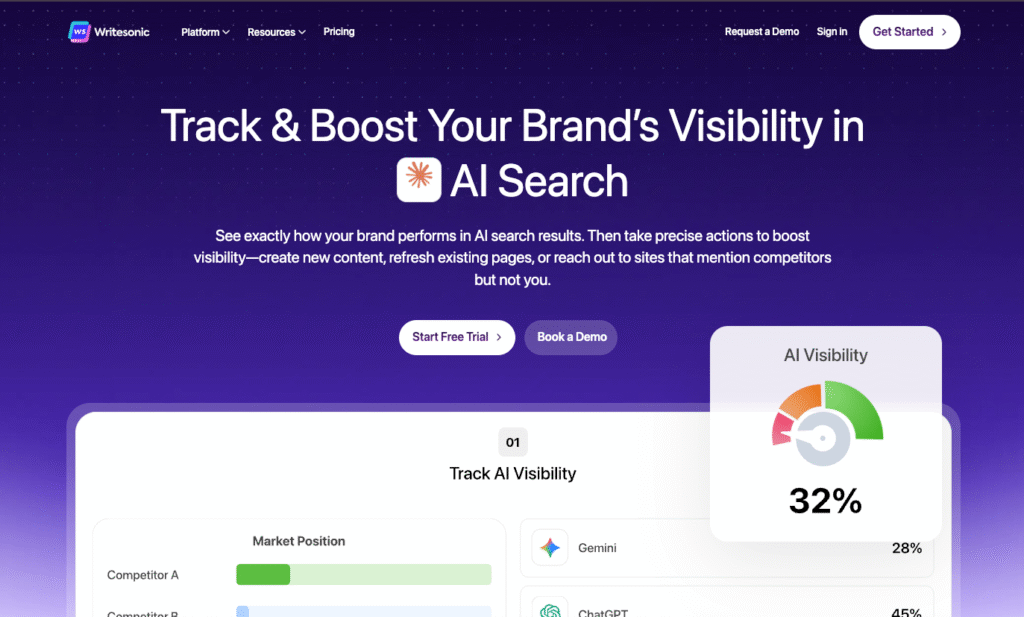
Writesonic is an all-in-one content generation platform offering not just text generation but also image creation and chatbot development.
It’s designed for users who want versatility without juggling multiple tools.
From writing product descriptions and blog posts to generating AI-driven images, Writesonic brings a broad feature set under one umbrella.
Use Case
Writesonic works well for entrepreneurs, startups, and small businesses that want a multipurpose AI for both written and visual content.
It’s also appealing for agencies that manage multiple content formats for clients.
Pros and Cons
Pros: Wide range of tools (text, images, chatbots), affordable for individuals and small teams, strong focus on productivity.
Cons: May lack the depth of specialization found in platforms focused only on writing or only on design.
Pricing
Writesonic offers free trials and several subscription tiers, with pricing that scales based on usage and access to premium models.
Business and enterprise plans provide more extensive features and support.
6. Perplexity AI

Perplexity AI is a research-focused assistant designed to provide clear, sourced answers.
Instead of simply generating responses, it cites its information directly from the web, giving users confidence in the accuracy of what they’re reading.
It’s especially strong at handling complex queries, summarizing articles, and offering well-structured answers.
The platform’s ability to combine conversational flow with transparency makes it stand out among general-purpose AI tools.
Use Case
Perplexity AI is best for students, professionals, and researchers who need fact-based outputs with credible references.
It’s an excellent option for users who value accuracy over creativity, and who often require links back to original sources for deeper exploration.
Pros and Cons
Pros: Provides citations for answers, great for research and fact-checking, easy-to-use interface.
Cons: Less creative and flexible for storytelling or imaginative writing.
Pricing
Perplexity AI offers a free version, with paid plans that unlock additional features such as advanced models and higher query limits.
7. Copy.ai
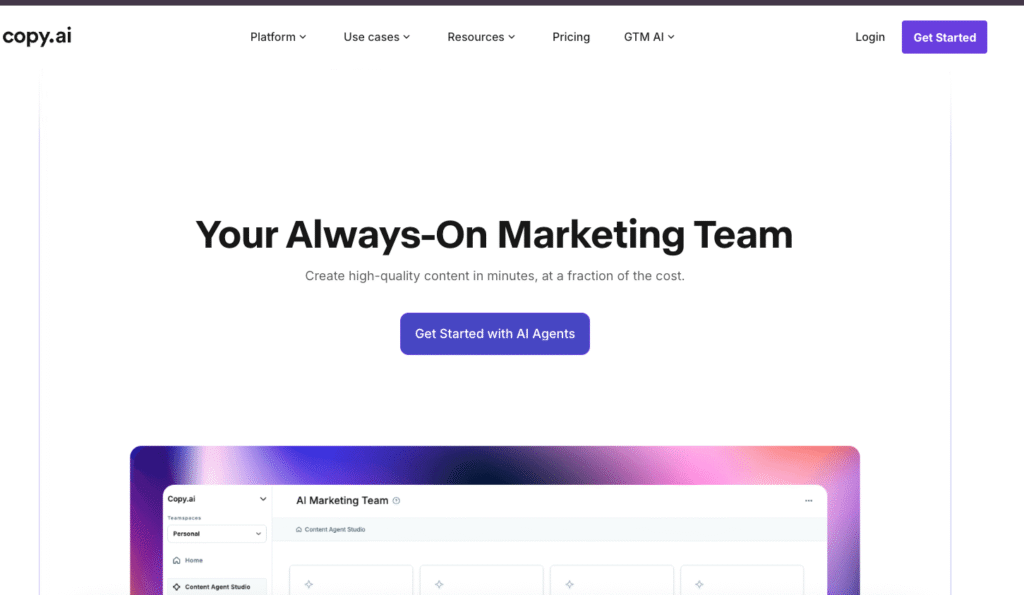
Copy.ai is a content generation platform built with marketers and businesses in mind. It specializes in producing copy for ads, email campaigns, product descriptions, and social media posts.
The tool’s strength lies in its structured prompts and templates, which make content creation faster while keeping tone and brand voice consistent.
Copy.ai has also started expanding into workflow automation, helping teams streamline their marketing processes.
Use Case
This tool is perfect for marketing teams, entrepreneurs, and e-commerce businesses that need consistent content output across multiple channels. It’s particularly helpful for those who don’t have large in-house content teams but still want professional-level copy.
Pros and Cons
Pros: Wide range of marketing templates, saves time, maintains brand consistency.
Cons: Not as strong for general-purpose writing, creativity can feel limited by templates.
Pricing
Copy.ai provides a free tier for basic usage, with premium subscriptions unlocking advanced features, longer word counts, and collaboration tools for teams.
Choosing the Right Qwen AI Alternative
When it comes to picking an alternative to Qwen AI, the key is understanding your specific needs. Some users prioritize creativity, while others require accuracy or integrations with existing tools.
The best choice often depends on whether you need an all-purpose assistant, a marketing-focused tool, or a research-oriented platform.
Taking the time to compare features and pricing ensures you don’t just adopt an AI for the sake of it, but select one that actively improves your workflow.
Balancing Cost and Features
Budget plays a huge role in the decision-making process. Many AI tools offer free versions with limited functionality, which are great for individuals testing the waters.
However, businesses and power users often find the paid tiers more valuable due to extended limits, premium models, and collaboration features.
By balancing cost against the features you actually need, you can avoid overpaying while still unlocking productivity benefits.
Integration with Daily Workflows
Another major factor when evaluating alternatives is how well they integrate into your existing tools.
Some platforms, like Gemini, are designed to slot directly into Google’s ecosystem, while others offer APIs for developers to build custom solutions.
Smooth integrations save time, reduce the need to switch between apps, and allow AI to become a natural part of your daily routine.
Ethical and Security Considerations
As AI adoption grows, concerns around data privacy, ethics, and bias have become more important.
Platforms like Claude AI emphasize safety and alignment, making them strong options for businesses handling sensitive information.
Choosing an AI tool that respects ethical guidelines and provides data protection can make a big difference in trust and long-term usability.
The Future of AI Alternatives
The AI landscape is evolving rapidly, and what feels cutting-edge today may be standard tomorrow.
New players continue to emerge with specialized features for industries like healthcare, law, and design.
Staying informed about these developments ensures you’re always ahead of the curve and able to adapt to changing opportunities.
Final Thoughts
Exploring Qwen AI alternatives is less about replacing one tool and more about building a toolkit that matches your goals.
With so many powerful options available, the choice ultimately depends on your priorities—be it cost, features, integrations, or ethics.
The right combination can help you work smarter, save time, and unlock new possibilities with AI.
FAQs
What is the best free alternative to Qwen AI?
ChatGPT and Perplexity AI both offer free versions that provide strong functionality without upfront cost.
Which Qwen AI alternative is best for businesses?
Jasper AI and Copy.ai are excellent for marketing teams, while Claude AI is strong for businesses prioritizing ethical use.
Can I use multiple AI tools together?
Yes, many professionals combine tools—for example, using Jasper for content and QuillBot for editing—to maximize results.
Are Qwen AI alternatives safe to use?
Most are safe, but reviewing privacy policies and ethical standards is important, especially for sensitive industries.
How often do AI tools update?
Most leading AI platforms update regularly, with new features and improvements rolling out every few months.
Author
-

Researches, analyzes, and reports on emerging trends and significant developments within the Artificial Intelligence (AI) and Machine Learning (ML) landscape. Identifies and interprets key shifts in technology, research, applications, and market dynamics to provide actionable insights.
View all posts
